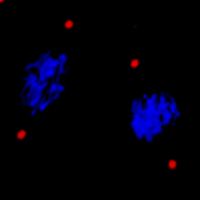Centrioles organise the assembly of two important cell organelles: centrosomes and the cilia; our goal is to understand how these organelles function at the molecular level. Centrosomes are the major microtubule (MT) organising centres in many animal cells, and they have an important role in cell division, in establishing and maintaining cell polarity and in positioning and transporting molecules and organelles within the cell. In addition, many cell-cycle regulators, signalling molecules and checkpoint proteins are concentrated at centrosomes, which thereby function as important signalling and coordination centres. Most cells in the human body form a single, immotile, primary cilium, which can have a vital role in cell signalling and in mechano- and chemo-sensation. Some specialised cells form motile cilia (or flagella), which function to either move the cells through fluid or move fluid over the cells. There is increasing evidence linking the dysfunction of centrosomes and cilia to a plethora of human pathologies, including cancer, microcephaly and dwarfism, obesity and macular degeneration. Therefore, understanding the basic molecular mechanisms that regulate the assembly and function of these organelles is important from both basic biological and clinical perspectives.
